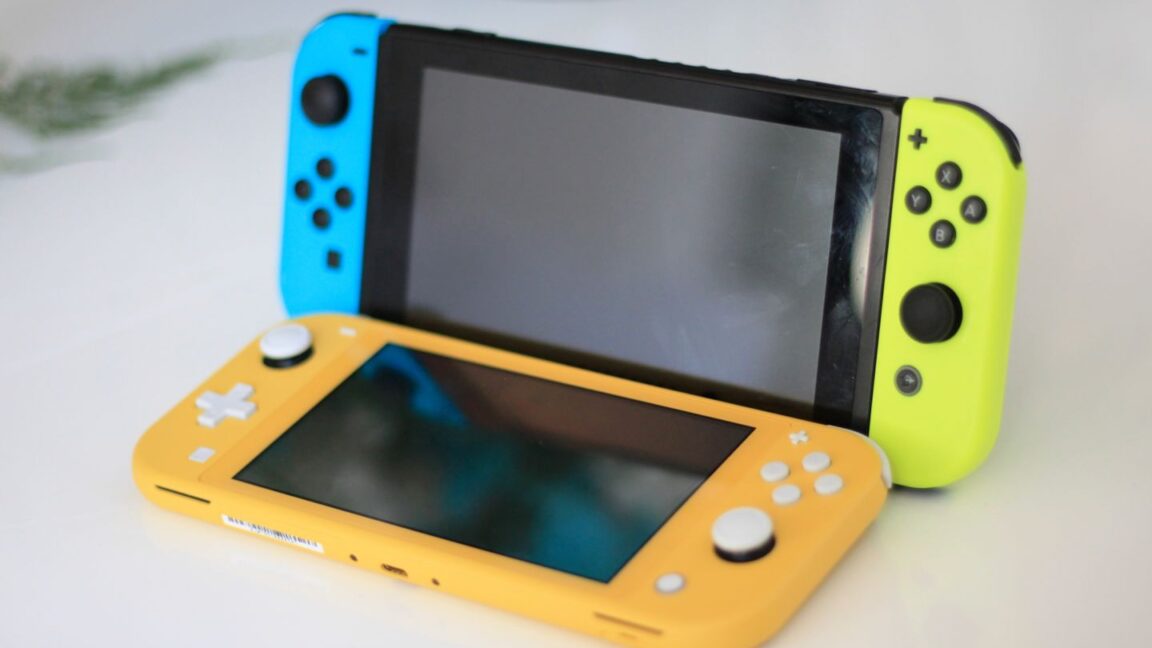Share and share unalike?
Nintendo imposes new limits on sharing for digital Switch games
New "Virtual Game Card" system prevents simultaneous online play from a single purchase.
Kyle Orland
–
Apr 30, 2025 12:44 pm
|
30
Nintendo is changing the way you sharing the same game across both of these Switch units.
Credit:
Kyle Orland
Nintendo is changing the way you sharing the same game across both of these Switch units.
Credit:
Kyle Orland
Text
settings
Story text
Size
Small
Standard
Large
Width
*
Standard
Wide
Links
Standard
Orange
* Subscribers only
Learn more
Minimize to nav
In advance of the Switch 2's planned June launch, Nintendo has released a system update for the original Switch that, among other things, activates the company's new Virtual Game Card system for sharing digital downloads. But Switch owners are finding that this new sharing system is a bit more limiting when it comes to sharing a single digital purchase for online play across multiple consoles.
For those who missed Nintendo's March announcement of the Virtual Game Card system, the new setup allows players to easily "unload" a digital game license from one Switch (or Switch 2) console and "load" it onto another console connected to the same Nintendo Account (or one in the same family group). An Internet connection is required for the initial loading and unloading process, but after that, the system with the Virtual Game Card can play the downloaded game completely offline.
For those who don't want to constantly load and unload their virtual games between systems, Nintendo also offers an "Online License" feature deep in the Switch's system menu. When this feature is turned on, if you load a digital game without a Virtual Game Card present, the Switch will perform an online check to confirm that your Nintendo Account actually has access to that game. Nintendo recommends this feature for players who want to share games across three or more Switch units.
Forget the old ways
Both the Virtual Game Cards and the Online License feature represent a significant change from Nintendo's previous system for managing digital games across multiple Switch units. Under that now-defunct setup, any number of users on a Switch designated as the "primary" console could play digital games without the need for an online check-in. Only users on any number of "secondary" consoles would need online access to confirm ownership when a game was launched.
A March video explaining the new Virtual Game Card system that launched via system update today.
While that old system could be cumbersome to set up, it actually allowed for quite a bit of flexibility when it came to game sharing. As Nintendo noted on its official FAQ as recently as last week, two users could play a single digital game purchase at the same time, as long as the Nintendo Account that purchased the game was playing on the secondary console (with an active Internet connection).
But Nintendo's FAQ explanation for "how to play the same digital game at the same time with different Nintendo accounts" has been removed from the current version of Nintendo's Switch digital game sharing FAQ. In its place is a link to a new page detailing the Virtual Game Card system. While the new FAQ also discusses the Online License feature for sharing games "even if you don't have a virtual game card loaded," there is no longer any discussion of how to access a single digital game on two consoles simultaneously.
Ars' own testing confirms that trying to load a digital game while another Switch is actively playing the same game results in a "play is being suspended" error on one console. This seems to be true even if one console has a loaded Virtual Game Card for the game being played and even if the consoles use different Nintendo Accounts from the same family group.
Players can simultaneously play different games from the same digital library on two different Switch systems, but only if at least one of those games is on a loaded Virtual Game Card.
A partial workaround
Players who want to play a single digital game purchased across multiple Switch consoles simultaneously can still use a partial workaround. A Switch console with a Virtual Game Card currently loaded should be set to Airplane mode (or have Wi-Fi disabled), and the user's Online License feature should be enabled for the game's original purchaser. The first system will still be able to play that Virtual Game Card offline, while the Online License feature will allow the same game to be played at the same time on a second system.
The major drawback of this workaround, of course, is that one Switch has to be completely offline for it to work. That means two players wanting to share a single digital copy of Mario Kart 8 for an online race won't be able to do so, for instance. It also means certain DLC tied to a Switch Online subscription won't be loadable on the offline system.
I hope each of those Yoshis has their own copy of Mario Kart World to play online...
Credit:
Nintendo
I hope each of those Yoshis has their own copy of Mario Kart World to play online...
Credit:
Nintendo
In a way, it's a bit surprising that Nintendo took this long to close what can be seen as a convenient loophole in its digital game sharing system. After all, players who buy a single copy of a physical game can't simultaneously play that game on two separate consoles. The fact that Switch owners could do that with digital games until now was something of an officially acknowledged bonus for players who opted for downloadable games.
With the impending launch of the Switch 2, though, Nintendo seems intent on making sure that each player owns their own copy of a game when playing together online (with the minor exception of the few games that use Nintendo's GameShare system). As Nintendo starts asking $80 for a single copy of Mario Kart World, that closed loophole could end up being costly for some multi-Switch households.
Kyle Orland
Senior Gaming Editor
Kyle Orland
Senior Gaming Editor
Kyle Orland has been the Senior Gaming Editor at Ars Technica since 2012, writing primarily about the business, tech, and culture behind video games. He has journalism and computer science degrees from University of Maryland. He once wrote a whole book about Minesweeper.
30 Comments










